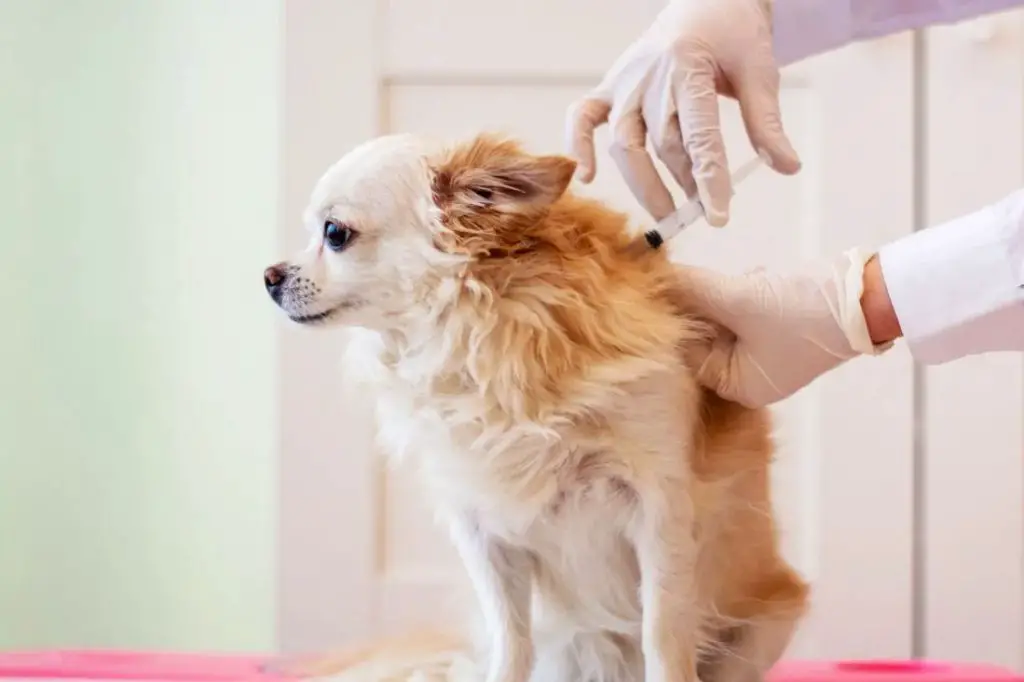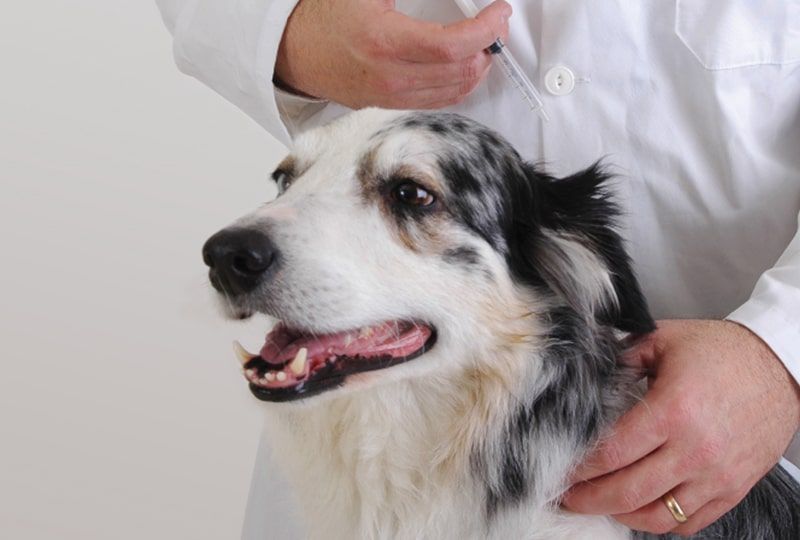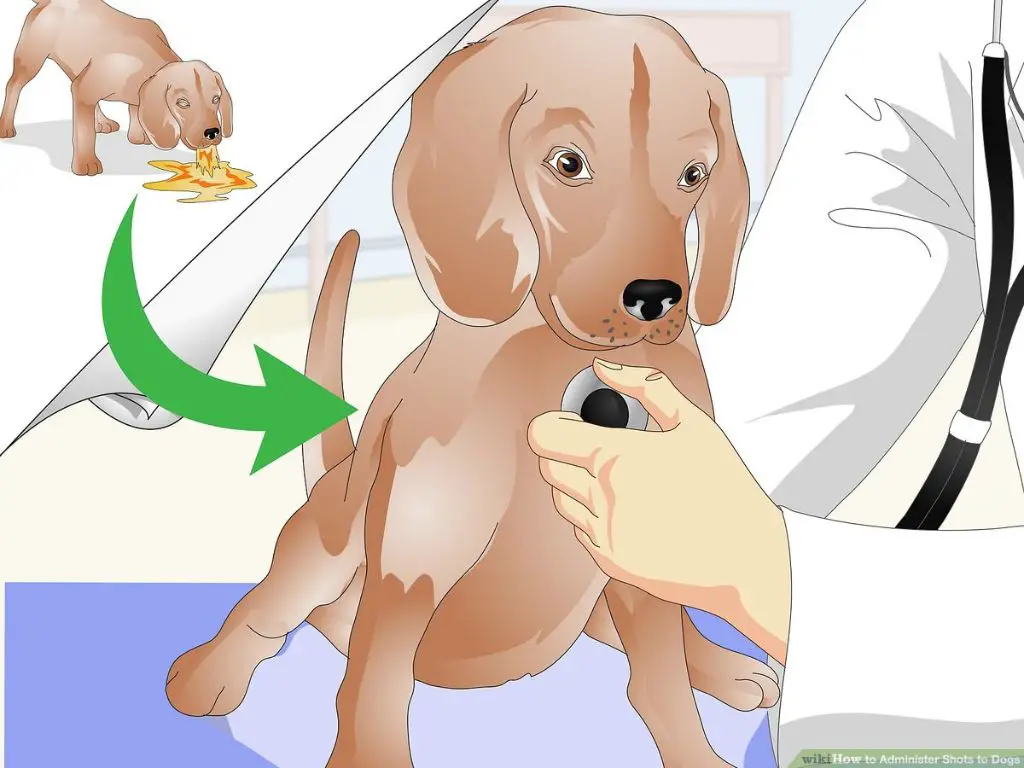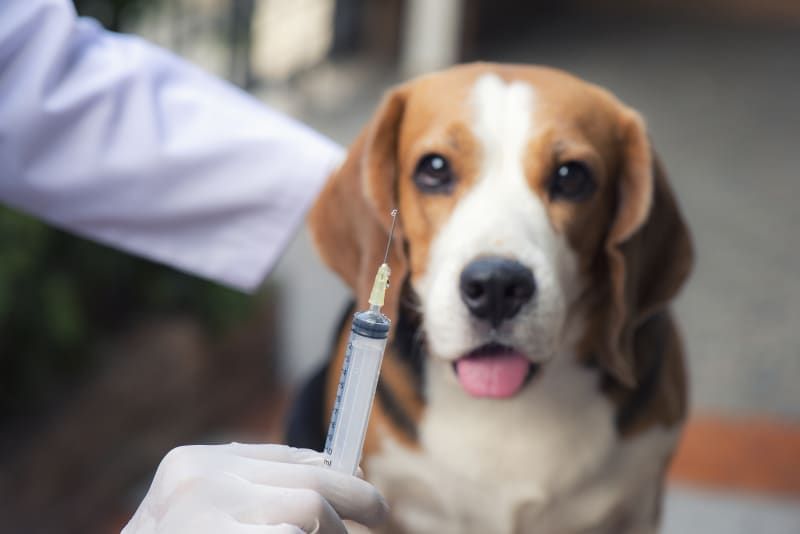Introduction
Getting regular vaccinations is an important part of keeping dogs healthy and preventing dangerous diseases. Vaccines work by exposing dogs to modified or killed versions of viruses and bacteria, allowing their immune system to build up antibodies and develop immunity. This protects them if they are ever exposed to the real disease-causing organism.
However, deciding whether or not to vaccinate a sick dog can be a tricky issue. There are risks associated with vaccines, and some illnesses may make dogs more vulnerable to side effects or less able to build immunity. At the same time, sick dogs are often the ones who need protection the most. Understanding the benefits and risks allows owners to make informed decisions alongside their veterinarian.
This provides an overview of the vaccination issue for sick dogs, emphasizing that while important for health, there are also risks to weigh when making decisions for vulnerable pets. Establishing the nuance upfront frames the rest of the content.
Risks of Vaccinating a Sick Dog

There are potential risks and side effects associated with vaccinating a sick dog. Vaccines stimulate the immune system, which could adversely affect a dog that is already fighting an illness. According to Dog’s Naturally Magazine, vaccinating an unhealthy pet can lead to adverse reactions including:
- Fever
- Seizures
- Autoimmune disease
- Anaphylactic shock
Other potential side effects mentioned in the source include lethargy, soreness at the injection site, vomiting, diarrhea, and behavioral changes. The immune stimulation from the vaccine could also potentially worsen or complicate the illness the dog is already fighting. Overall, vaccinating a sick dog runs the risk of overtaxing the immune system, exacerbating the illness, and causing adverse reactions.
Benefits of Vaccinating a Sick Dog
Disease prevention is probably the most obvious – and the most important – reason for dog vaccinations. There are a variety of highly contagious and potentially fatal diseases that dogs are commonly vaccinated against. Vaccinations prepare a dog’s immune system to fight off viruses or bacteria they come into contact with, preventing them from getting seriously ill. Some illnesses that vaccines can prevent include:
- Rabies – Rabies is almost always fatal once clinical signs appear. Vaccination is an important measure to prevent this disease in dogs (1).
- Distemper – Canine distemper is a viral disease that can lead to severe respiratory, gastrointestinal, and neurological symptoms. It has a high mortality rate and vaccination provides effective protection (1).
- Parvovirus – Canine parvovirus is highly contagious and often fatal in puppies and unvaccinated dogs. The parvovirus vaccine provides protection against infection (1).
- Leptospirosis – Leptospirosis is a bacterial disease that can damage the liver and kidneys. The vaccine protects dogs from infection (1).
While no vaccine is 100% effective, most routine vaccines protect over 90% of vaccinated dogs that are exposed to these viruses or bacteria. By vaccinating even when a dog is sick, their immunity can be maintained to continue preventing these potentially fatal diseases (2).
(1) https://www.avma.org/resources-tools/pet-owners/petcare/vaccinations
(2) https://sykesvillevetclinic.com/news/5-benefits-dog-vaccinations/
When to Avoid Vaccines

Some dogs should not receive vaccines due to their health conditions. According to Family Veterinary Mobile, severely immunocompromised dogs should avoid vaccines since their immune systems cannot handle the virus strains properly [1]. Their compromised immune systems already struggle to fight infections, so introducing vaccine viruses can overwhelm the immune system. Some immunocompromised conditions include canine distemper virus, parvovirus, adenovirus infection, and properoception and pain issues.
Additionally, dogs receiving immunosuppressive drugs like chemotherapy, radiation therapy, steroids, or cyclosporine should skip vaccines until fully recovered. Immunosuppressed dogs risk developing severe adverse reactions to vaccines ranging from lack of immunity to severe tissue inflammation leading to organ damage or death [1]. Owners should consult their veterinarian to determine if their dog qualifies as immunocompromised and requires delaying or skipping vaccines.
Consulting a Veterinarian
Professional advice from a licensed veterinarian is crucial when deciding whether or not to vaccinate a sick dog. Veterinarians are trained to weigh the potential risks and benefits of vaccinating ill pets on a case-by-case basis. They will perform a physical exam and review the dog’s medical history to assess its current health status. Factors like the dog’s age, medical conditions, medications, immune function, and lifestyle are all important considerations.
Veterinarians can help determine if delaying certain non-core vaccines is recommended based on the dog’s illness. They may run pre-vaccine blood tests to check antibody levels from previous vaccines. If antibody levels are adequate, some vaccines may be temporarily skipped. Core vaccines like rabies may still be advised, even for sick dogs, due to legal requirements and public health risks.
Veterinary guidance is key for proper vaccine selection, timing, dosage, route of administration, and monitoring for adverse reactions. They can also provide prescription medications to help manage vaccine reactions, if any occur. Some veterinarians may advise against vaccinating very ill or debilitated dogs. Overall, consulting an experienced veterinarian is vital when vaccinating a sick dog to ensure safety and efficacy.
According to the American Veterinary Medical Association, establishing a relationship with a trusted veterinarian through regular wellness exams provides the best chance for long-term health in pets (https://www.avma.org/resources-tools/pet-owners/petcare/vaccinations).
Common Illnesses and Vaccines
Some of the most common and serious illnesses that dogs can be vaccinated against include:
Kennel Cough – Also known as bordetellosis or tracheobronchitis, kennel cough is an upper respiratory infection that causes a persistent cough. It’s highly contagious and spreads easily where dogs are in close contact. Vaccines such as intranasal Bordetella bronchiseptica vaccines help prevent this illness. https://www.avma.org/resources-tools/pet-owners/petcare/vaccinations
Parvovirus – Canine parvovirus is a highly contagious viral illness that causes severe vomiting and diarrhea leading to dehydration, electrolyte imbalances, and potentially death. The parvovirus vaccine is considered a core vaccine for all dogs. Proper vaccination provides excellent protection against parvo. http://publichealth.lacounty.gov/vet/HPHF/HPHF_Vx.htm
Distemper – Canine distemper is an extremely contagious and often fatal viral disease that impacts the respiratory, gastrointestinal, and nervous systems. Distemper vaccines are core vaccines that protect against this disease in puppies and adult dogs when boostered regularly.
Rabies – Rabies is a fatal viral disease affecting the central nervous system. Rabies vaccination is required by law for dogs in the United States. The rabies vaccine protects dogs from contracting this deadly zoonotic disease.
Proper Administration
Vaccines should be administered properly for maximum safety and efficacy. According to the 2022 AAHA Canine Vaccination Guidelines, vaccines should be administered by subcutaneous injection in the lateral thorax or thigh using sterile needles and syringes. Locations on the right side may be preferred for ease of administration in right-handed individuals. Alternating vaccine locations is recommended if administering multiple vaccines at the same visit.

The guidelines also provide a suggested vaccination schedule, with core vaccines starting at 6-8 weeks of age, then boosters every 3-4 weeks until 16 weeks old. Rabies vaccines should be administered at 12-16 weeks. After the initial series, boosters are recommended every 1-3 years depending on the vaccine and risk factors. Consult your veterinarian on the appropriate schedule for your dog.
Proper handling, preparation, and aseptic injection technique is critical. Vaccines should be warmed to room temperature before administration and injected quickly to avoid damaging the antigens. Gentle massage of the injection site can help disperse the vaccine. Careful adherence to these guidelines can help reduce adverse reactions.
Aftercare
It’s important to monitor your dog after vaccination to watch for any side effects or adverse reactions. These usually occur within 30-60 minutes of the vaccine being administered. According to VCA Animal Hospitals, you should wait at the vet clinic for at least 30 minutes after your dog receives their shots.

Potential side effects to look out for include facial swelling, hives, vomiting, diarrhea, lethargy, and difficulty breathing. Most side effects are mild, but some dogs can have a severe allergic reaction. If your dog has a concerning reaction, notify your vet immediately for evaluation and treatment.
Once you take your dog home after vaccination, continue watching them closely for the next several days. According to Vetwest Veterinary Clinics, most pets show no obvious response and act normally after vaccines. But if you notice anything unusual, contact your vet right away.
It’s also a good idea to limit your dog’s activity and exercise for 24-48 hours post-vaccination. And restrict access to dog parks and daycares during this time, as their immune system is still processing the vaccine. With some rest and supervision, your pup should bounce back quickly.
Sources:
https://vcahospitals.com/know-your-pet/care-for-your-pet-after-vaccination
https://www.vetwest.com.au/pet-library/pet-vaccination-aftercare/
Vaccine Types
Vaccines for dogs fall into three main categories: core, non-core, and optional. Core vaccines are considered essential for all dogs based on risk of exposure, severity of disease or transmissibility to humans. These include distemper, adenovirus, parvovirus and rabies vaccines. According to veterinary guidelines, core vaccines should be given to most dogs (Source 1).
Non-core vaccines are those that are required by only those animals whose geographical location, local environment or lifestyle places them at risk of contracting specific infections. These include parainfluenza virus, Bordetella bronchiseptica, leptospirosis, Lyme disease and canine influenza vaccines. Veterinarians can make recommendations on non-core vaccines based on the dog’s individual circumstances (Source 2).
Finally, optional vaccines are those that may offer limited protection or provide protection against an uncommon disease or condition. These are up to the owner’s discretion after consultation with a veterinarian. Optional vaccines include rattlesnake envenomation, giardia and canine coronavirus vaccines.
Conclusion
In summary, vaccinating sick dogs requires careful consideration of the risks and benefits. While there are some situations where it is best to avoid vaccinating an ill dog, in many cases the benefits outweigh the risks. It’s important to consult with a veterinarian, who can evaluate the dog’s health status and recommend the appropriate vaccines and schedule. With proper precautions like spacing out vaccines, using intra-nasal or single-antigen vaccines when possible, and monitoring the dog post-vaccination, vaccines can often be safely administered even to dogs with compromised immune systems. The takeaway is to not make blanket assumptions, but instead have an open and informed discussion with your vet. Together you can make the best decision for your individual dog’s health.